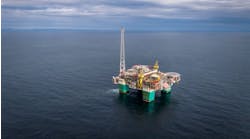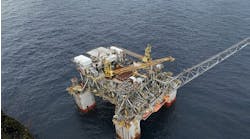Offshore staff
EDINBURGH, UK –Wood Mackenzie has assessed at what price the operating cash flow from producing oil fields turns negative.
While Wood Mackenzie does not think this floor will necessarily be triggered, this latest analysis serves to gauge where it is and how much supply would be affected at what level. Wood Mackenzie concludes that a Brent price of $40/bbl or below would see producers shutting in production at a level where there is a significant reduction of global supply.
“The cash operating cost for oil fields becomes very important as prices producers can achieve for the oil they produce nears the marginal point,” said Robert Plummer, corporate research analyst for Wood Mackenzie. “When and how that might be reached is never easy to predict.
“The point at which producing oil fields become cash negative is key in assessing how far the oil price could fall. Once the oil price reaches these levels, producers have a sometimes complex decision to continue producing, losing money on every barrel produced, or to halt production, which will reduce supply.”
“Cash negative” means the point at which the oil costs more to produce than the operator can sell it for.
The analysis of world liquids production of 75 MMb/d resulted in delineation of three oil price points, the impact onproduction, and the percent of supply that would turn cash negative:
- At $50/bbl Brent, only 190,000 b/d of oil production is cash negative, representing 0.2% of global supply. Seventeen countries supply oil that is cash negative at $50, with the main contributors beingthe UK and the US.
- At $45, 400,000 b/d is cash negative, or 0.4% of global supply. Half of this production is from conventional onshore production in the US.
- At $40, 1.5 MMb/d is cash negative, or 1.6% of global supply. At this point, the biggest contribution is from several oil sands projects in Canada. Tight oil production only starts to become cash negative as theBrent oil price falls into the high $30s.
There is no guarantee these volumes would be shut-in. Operators may prefer to continue producing oil at a loss rather than stop production, Plummer said.
There also are considerations of restart costs for any halted production and government revenues connected to production that might affect the actual industry response.
01/12/2015


